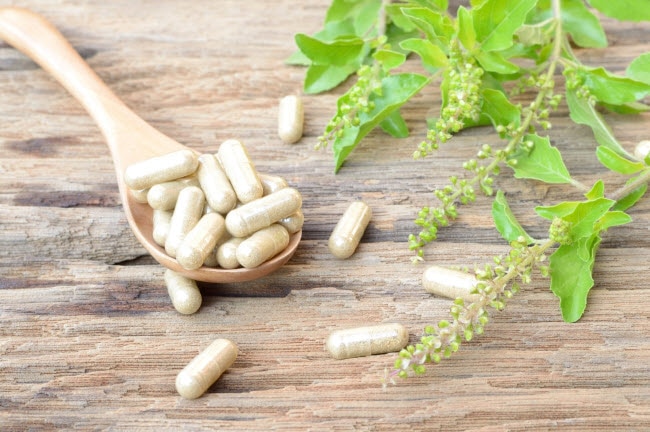The days are colder and shorter. Everyone is spending more time indoors. And the holiday season has arrived. It’s a festive time of year, but it also can be exhausting. Early winter is when most people start feeling the immune challenges that the season brings. Now is an ideal time to bolster your immune health and fortify your reserves. Fortunately, Mother Nature offers us time-honored botanicals that have been utilized for centuries in the quest for optimal health.

Strengthen your immune system with herbal support†
1. Elderberry
A favorite plant for seasonal support is elderberry. This beautiful, dark purple berry has been revered in Europe for hundreds if years for its health-supportive properties. In fact, the Greek physician Hippocrates referred to elderberry as his “medicine chest.” In recent years, researchers have been studying the ways that elderberry functions to support a healthy immune response.† We know that the brightly pigmented berries are a source of anthocyanins, which are a type of flavonoid also found in blueberries, raspberries and bilberries. The fruit is best taken as an elderberry supplement in the early stages of seasonal challenges to support immune function.†
2. Echinacea
Perhaps the most well-known herb for immune support is echinacea. Also known as “coneflower,”echinacea is native to North American and can be found growing in many gardens throughout the country. The most commonly used echinacea species in botanical supplements is Echinacea purpurea. The aerial parts (flower and leaves) are known for their immune-promoting properties.* Look for echinacea in a combination supplement formula, such as MegaFood Acute Defense, with other immune-supportive herbs and nutrients.
3. Andrographis
A third herb to note is andrographis. Andropgrahis, native to India and China, is a botanical that has been used traditionally during times of immune challenge.[1] Andrographis is a bitter herb that may help support quick immune function.*
Along with botanicals, it’s vital to keep up with nutrients that support immune health, such as zinc, vitamin C and vitamin D.* Many people are unsure about the proper dosage of vitamin D to meet their individual needs. The best way to know how much vitamin D you should supplement with is to work with your healthcare practitioner, and get a 25-hydroxy vitamin D blood test. Knowing your vitamin D levels takes the guesswork out of supplementation.
With a right combination of botanical and nutrient support, you can fortify yourself for the winter ahead, and thrive through this season.
[1] The Scientific World Journal. Volume 2014, Article ID 274905, Andrographis paniculata (Burm. f.) Wall. ex Nees: A Review of Ethnobotany, Phytochemistry and Pharmacology. Md. Sanower Hossain,1 Zannat Urbi,1 Abubakar Sule,2 and K. M. Hafizur Rahman3
†These statements have not been approved by the Food and Drug Administration. These products are not intended to diagnose, treat, cure or prevent disease.
 Article contributed by Erin Stokes, N.D., Medical Director. Dr. Stokes received her naturopathic doctor degree from Bastyr University in 2001. Shortly afterwards she began to pursue her passion for educating others by teaching Western Pathology and Psychology of Healing at Southwest Acupuncture College in Boulder, Colo. She combines her experience as a naturopathic doctor with an extensive background in the natural retail industry, most recently providing naturopathic consultations at an integrative pharmacy for over six years. Her personal mission is to empower people with the inspiration and tools to change their lives, and she is a frequent radio show and podcast guest. Dr. Stokes is a registered Naturopathic Doctor in Colorado, and lives with her family in Boulder, Colo.
Article contributed by Erin Stokes, N.D., Medical Director. Dr. Stokes received her naturopathic doctor degree from Bastyr University in 2001. Shortly afterwards she began to pursue her passion for educating others by teaching Western Pathology and Psychology of Healing at Southwest Acupuncture College in Boulder, Colo. She combines her experience as a naturopathic doctor with an extensive background in the natural retail industry, most recently providing naturopathic consultations at an integrative pharmacy for over six years. Her personal mission is to empower people with the inspiration and tools to change their lives, and she is a frequent radio show and podcast guest. Dr. Stokes is a registered Naturopathic Doctor in Colorado, and lives with her family in Boulder, Colo.
